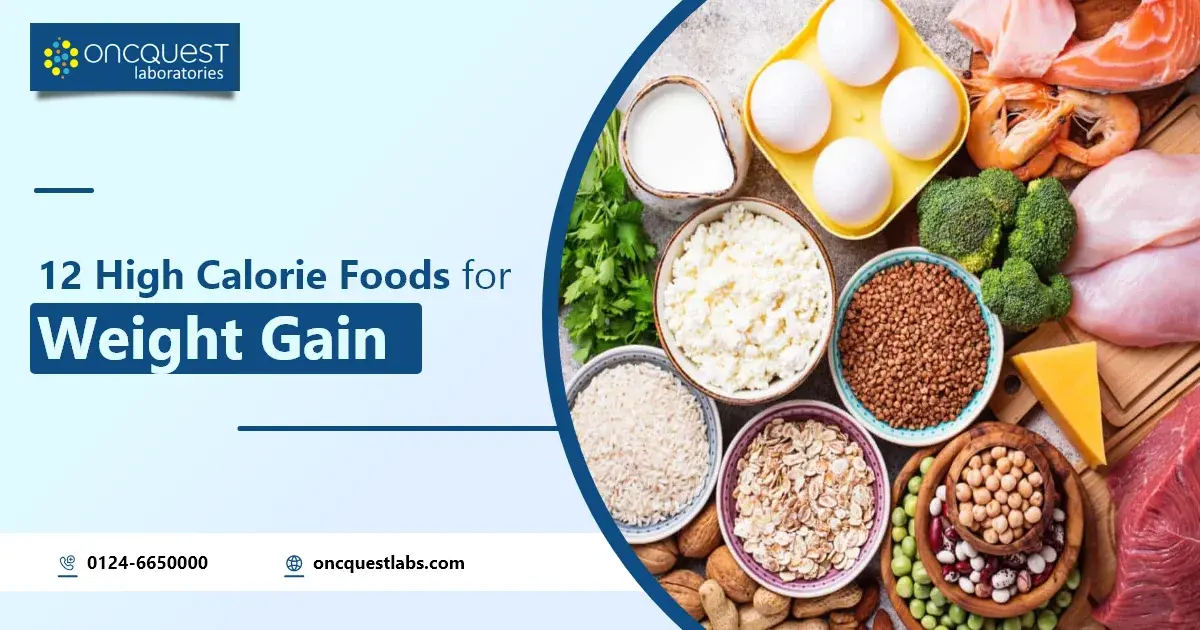Gaining weight can be just as challenging as losing it, especially for individuals with fast metabolisms, athletes looking to build muscle, or those recovering from illness. While the common focus in health and fitness is often on weight loss, gaining weight in a healthy and controlled manner is equally important for overall well-being. High-calorie foods play a crucial role in this process by providing the necessary energy and nutrients needed to build muscle, maintain energy levels, and support bodily functions. This article will guide you through a variety of nutritious high-calorie foods that can help you achieve your weight gain goals. Whether you’re looking to add muscle mass, recover from an illness, or simply improve your overall health, these foods will help you gain weight in a healthy and balanced way.
Contents
- 1 High-Calorie Foods for Weight Gain
- 2 Food to Gain Weight for Females
- 3 High Calorie Foods for Weight Gain Vegetarian
- 4 Conclusion
- 5 Frequently Asked Questions (FAQs)
High-Calorie Foods for Weight Gain
Dairy Products
Dairy products are nutrient-dense and provide a significant amount of calories, proteins, and fats, essential for healthy weight gain.
Whole Milk
Whole milk is a nutrient-rich beverage, providing about 150 calories per glass. It’s an excellent source of high-quality protein, calcium, and vitamin D, essential for bone health and muscle growth. Whole milk’s healthy fats support weight gain and overall health. Its versatility allows it to be enjoyed on its own, added to smoothies, used in cooking and baking, or as a base for nutritious shakes, making it a valuable addition to any diet.
Cheese
Cheese is a high-calorie, nutrient-dense food, offering around 113 calories per slice. Rich in protein, healthy fats, and essential minerals like calcium, cheese supports bone health and muscle growth. Its versatility makes it a popular choice for weight gain, as it can be added to sandwiches, salads, pasta dishes, or enjoyed as a snack with crackers. With various types to choose from, cheese adds flavor and nutritional value to a wide range of meals.
Yogurt
Yogurt, especially full-fat yogurt, is a nutrient-dense food providing around 150 calories per cup. It is rich in protein, calcium, and probiotics, which support digestive health and strengthen the immune system. Versatile and delicious, yogurt can be enjoyed on its own, mixed with fruits and nuts, added to smoothies, or used as a base for dressings and dips. Its creamy texture and nutritional benefits make it an excellent addition to a balanced diet.
Nuts and Seeds
Nuts and seeds are calorie-dense and packed with healthy fats, proteins, and fiber, making them ideal for weight gain.
Almonds
Almonds are a nutritious, high-calorie snack, offering around 160 calories per ounce. Packed with protein, healthy fats, and vitamin E, they support heart health and skin health. Almonds are also rich in fiber and essential minerals like magnesium and calcium. Versatile and convenient, they can be eaten on their own, added to salads, blended into smoothies, or used in baking. Their nutritional benefits and delicious taste make almonds a great addition to any diet.
Walnuts
Walnuts are a nutrient-rich snack, providing approximately 185 calories per ounce. They are high in healthy fats, particularly omega-3 fatty acids, which support heart and brain health. Walnuts also offer protein, fiber, and essential vitamins and minerals like magnesium and vitamin E. Versatile and tasty, they can be eaten on their own, added to salads, cereals, baked goods, or used in cooking. Their nutritional benefits and rich flavor make walnuts a valuable addition to a balanced diet.
Chia Seeds
Chia seeds are a nutritional powerhouse, providing around 137 calories per ounce. Rich in omega-3 fatty acids, fiber, and protein, they support heart health, digestion, and sustained energy levels. Chia seeds also contain essential minerals like calcium, magnesium, and phosphorus. Versatile and easy to use, they can be sprinkled on yogurt, added to smoothies, mixed into oatmeal, or used to make chia pudding. Their numerous health benefits and ease of use make chia seeds a great addition to any diet.
Healthy Oils and Fats
Healthy oils and fats are essential for adding calories to your diet without increasing the volume of food you consume.
Olive Oil
Olive oil is a calorie-dense, heart-healthy oil, providing about 120 calories per tablespoon. Rich in monounsaturated fats and antioxidants, it supports cardiovascular health and reduces inflammation. Olive oil is also a good source of vitamin E. Its versatile flavor makes it ideal for cooking, drizzling over salads, or dipping with bread. Incorporating olive oil into your diet adds a nutritious, flavorful component to meals, promoting overall health and well-being.
Avocado
Avocado is a nutrient-dense fruit, providing around 240 calories per avocado. Rich in healthy monounsaturated fats, fiber, and essential vitamins like vitamins E and C, it supports heart health, digestion, and skin health. Avocados also contain potassium and folate, beneficial for overall well-being. Versatile and delicious, they can be added to salads, sandwiches, smoothies, or enjoyed on toast. Their creamy texture and numerous health benefits make avocados a valuable addition to a balanced diet.
Coconut Oil
Coconut oil is a high-calorie, versatile oil, providing about 120 calories per tablespoon. Rich in medium-chain triglycerides (MCTs), it supports energy levels and metabolism. Coconut oil also contains lauric acid, known for its antimicrobial properties. Its high smoke point makes it ideal for cooking and baking, while its subtle flavor complements a variety of dishes. Additionally, coconut oil can be used in smoothies, and coffee, and as a natural skin moisturizer, making it a valuable addition to any diet.
Protein-Rich Foods
Protein is essential for muscle growth and repair, making protein-rich foods crucial for weight gain.
Red Meat
Red meat is a nutrient-dense food, providing approximately 250 calories per 3-ounce serving. It’s rich in high-quality protein, essential for muscle growth and repair, and contains vital nutrients like iron, zinc, and vitamin B12, which support overall health and energy levels. Red meat is versatile and can be prepared in various ways, such as grilling, roasting, or stewing. Including red meat in your diet can contribute to balanced nutrition and effective weight gain.
Salmon
Salmon is a nutrient-rich fish, providing around 206 calories per 3-ounce serving. It’s an excellent source of high-quality protein, healthy omega-3 fatty acids, and essential vitamins like vitamin D and B12, which support heart and brain health. Salmon also contains antioxidants like astaxanthin. Versatile and delicious, it can be grilled, baked, or added to salads and pasta dishes. Its rich flavor and numerous health benefits make salmon a valuable addition to a balanced diet.
Eggs
Eggs are a nutrient-rich food, providing about 75 calories and 6 grams of protein each. They contain essential vitamins and minerals like vitamin B12, vitamin D, and selenium, which support overall health. Eggs are also high in healthy fats and antioxidants such as lutein and zeaxanthin, which benefit eye health. Versatile and easy to prepare, they can be boiled, scrambled, fried, or used in various recipes, making them a valuable addition to any diet.
Starchy Vegetables and Grains
Starchy vegetables and grains provide complex carbohydrates and are high in calories, making them great for weight gain.
Sweet Potatoes
Sweet potatoes are a nutritious, high-calorie food, providing around 112 calories per medium-sized potato. They are rich in complex carbohydrates, fiber, and essential vitamins such as vitamin A, vitamin C, and several B vitamins. Sweet potatoes also contain important minerals like potassium and manganese. Their natural sweetness and versatility make them easy to incorporate into various dishes, whether baked, mashed, roasted, or added to soups and stews. Their nutritional benefits support overall health and energy levels.
Quinoa
Quinoa is a nutrient-dense grain, providing about 222 calories per cup when cooked. It is a complete protein, containing all nine essential amino acids, making it an excellent choice for vegetarians and vegans. Quinoa is also rich in fiber, vitamins such as B vitamins and vitamin E, and minerals like magnesium, iron, and phosphorus. Its versatility allows it to be used in salads, as a side dish, in soups, or as a breakfast porridge, making it a valuable addition to a healthy diet.
Brown Rice
Brown rice is a nutritious whole grain, offering around 216 calories per cup when cooked. It is rich in complex carbohydrates, fiber, and essential nutrients like B vitamins, magnesium, and selenium. Brown rice supports digestive health and provides sustained energy due to its high fiber content. Versatile and easy to prepare, it can be used as a base for stir-fries, added to soups, or served as a side dish, making it a valuable addition to a balanced diet.
Dried Fruits
Dried fruits are calorie-dense and provide essential vitamins and minerals, making them a convenient snack for weight gain.
Dates
Dates are a highly nutritious and calorie-dense fruit, providing about 277 calories per 100 grams. They are rich in natural sugars, fiber, and essential nutrients such as potassium, magnesium, and vitamin B6. Dates offer a quick energy boost and support digestive health due to their high fiber content. Versatile and sweet, they can be enjoyed on their own, added to smoothies, used in baking, or incorporated into savory dishes, making them a valuable addition to a healthy diet.
Raisins
Raisins are a nutrient-rich, high-calorie snack, providing approximately 299 calories per cup. They are packed with natural sugars, fiber, and essential nutrients like iron, potassium, and antioxidants. Raisins support energy levels, digestive health, and overall well-being. Versatile and sweet, they can be enjoyed on their own, added to cereals, yogurt, salads, or baked goods. Their convenient size and nutritional benefits make raisins a valuable addition to a balanced diet.
Prunes
Prunes, also known as dried plums, are a nutritious and high-calorie fruit, providing around 240 calories per cup. They are rich in fiber, which supports digestive health and helps prevent constipation. Prunes are also a good source of vitamins and minerals, such as vitamin K, vitamin A, potassium, and iron. Their natural sweetness and versatility make them a great addition to cereals, yogurt, baked goods, or enjoyed on their own as a snack. Their health benefits and delicious taste make prunes a valuable addition to a balanced diet.
Smoothies and Shakes
Smoothies and shakes are an excellent way to pack in calories and nutrients in a convenient, drinkable form.
High-Calorie Smoothie Recipes
Creating high-calorie smoothies can include ingredients like whole milk, yogurt, nut kinds of butter, fruits, and protein powders. These smoothies can provide a significant calorie boost and are easy to customize based on your taste preferences.
Protein Shakes
Protein shakes are effective for weight gain, especially when combined with healthy fats like peanut butter or avocado. Homemade protein shakes can include protein powder, milk, bananas, and honey for extra calories.
Whole Grains and Breads
Whole grains and breads are rich in calories and provide sustained energy due to their complex carbohydrate content.
Whole Grain Bread
Whole grain bread is a nutritious, high-calorie food, offering around 70-80 calories per slice. It is rich in complex carbohydrates, fiber, and essential nutrients such as B vitamins, iron, and magnesium. The high fiber content supports digestive health and provides sustained energy. Whole grain bread can be enjoyed in various ways, including as a base for sandwiches, toast, or paired with soups and salads. Its nutritional benefits and versatility make it a valuable addition to a balanced diet.
Oatmeal
Oatmeal is a nutrient-dense, high-calorie food, providing about 150 calories per cup (cooked). It is rich in complex carbohydrates, fiber, and essential nutrients such as iron, magnesium, and B vitamins. The high fiber content, particularly beta-glucan, supports heart health, digestion, and sustained energy levels. Oatmeal is versatile and can be enhanced with toppings like fruits, nuts, seeds, or honey, making it a delicious and nutritious breakfast option that supports overall health and well-being.
Granola
Granola is a nutrient-dense, high-calorie food, providing around 450 calories per cup. It typically contains a mix of oats, nuts, seeds, and sweeteners, offering a rich source of fiber, healthy fats, and protein. Granola is also packed with essential vitamins and minerals like iron, magnesium, and vitamin E. Versatile and tasty, it can be enjoyed with milk or yogurt, sprinkled on smoothie bowls, or eaten as a snack. Its nutritional benefits and delicious crunch make granola a valuable addition to a balanced diet.
Food to Gain Weight for Females
For females looking to gain weight healthily and sustainably, incorporating a variety of nutrient-dense, high-calorie foods is essential. Whole milk, rich in calories and calcium, supports bone health and muscle growth. Cheese and full-fat yogurt provide protein, healthy fats, and essential nutrients that aid in weight gain and overall wellness. Nuts and seeds, such as almonds and chia seeds, are calorie-dense and packed with healthy fats, fiber, and protein, making them excellent snacks or additions to meals. Healthy oils like olive and coconut oil can be used in cooking to boost calorie intake while providing beneficial fatty acids. Protein-rich foods like eggs, salmon, and lean meats are crucial for muscle development and recovery.
Complex carbohydrates found in whole grains like quinoa and brown rice offer sustained energy and are rich in fiber and essential minerals. Starchy vegetables like sweet potatoes provide a good mix of calories, vitamins, and antioxidants. Dried fruits, such as dates, raisins, and prunes, are convenient, high-calorie snacks that also offer a range of vitamins and minerals. Incorporating high-calorie smoothies and shakes, enriched with ingredients like nut butter, protein powders, and fruits, can effectively increase daily calorie intake.
By choosing these nutrient-dense options, females can ensure they gain weight healthily, supporting their overall health and fitness goals.
High Calorie Foods for Weight Gain Vegetarian
For vegetarians looking to gain weight, incorporating high-calorie, nutrient-dense foods into their diet is essential. Whole grains such as quinoa and brown rice provide complex carbohydrates, protein, and essential minerals, offering sustained energy and aiding in weight gain. Nuts and seeds, including almonds, walnuts, and chia seeds, are calorie-dense and packed with healthy fats, protein, and fiber, making them ideal snacks or additions to meals. Full-fat dairy products like whole milk, cheese, and yogurt offer rich sources of protein, calcium, and healthy fats, supporting muscle growth and overall health.
Avocados are another excellent option, rich in monounsaturated fats, fiber, and various vitamins and minerals, adding both calories and nutrients to meals. Incorporating healthy oils such as olive oil and coconut oil in cooking and dressings can significantly boost calorie intake while providing beneficial fatty acids. Dried fruits like dates, raisins, and prunes are high in natural sugars and calories, making them convenient and nutritious snacks. Additionally, high-calorie smoothies and shakes, made with ingredients like nut butters, fruits, and protein powders, can be an effective way to increase daily calorie intake. By focusing on these high-calorie vegetarian foods, individuals can achieve healthy weight gain while maintaining a balanced and nutritious diet.
Conclusion
Incorporating high-calorie, nutrient-dense foods into a vegetarian diet is essential for healthy weight gain. By focusing on whole grains, nuts, seeds, full-fat dairy, avocados, healthy oils, dried fruits, and nutrient-rich smoothies, individuals can effectively increase their calorie intake while ensuring they receive essential nutrients. These foods not only support weight gain but also promote overall health and well-being. A balanced approach, combined with regular meals and snacks, can help achieve weight gain goals sustainably and healthily.
Frequently Asked Questions (FAQs)
How often should I eat to gain weight on a vegetarian diet?
To gain weight, aim to eat three main meals and 2-3 snacks per day. This ensures a consistent intake of calories throughout the day.
Can I gain weight by eating only plant-based foods?
Yes, you can gain weight on a plant-based diet by incorporating high-calorie, nutrient-dense foods like nuts, seeds, avocados, whole grains, and dried fruits.
What are some high-calorie snacks for vegetarians?
High-calorie snacks include nuts, seeds, dried fruits, full-fat yogurt, cheese, nut butters, and smoothies made with calorie-rich ingredients.
Is it healthy to gain weight quickly?
Gaining weight too quickly can lead to fat gain rather than muscle gain. Aim for a gradual increase of 0.5-1 pound per week for healthy weight gain.
How can I add more calories to my meals?
Add healthy oils to your cooking, use nut butters, include full-fat dairy products, and add extra portions of high-calorie foods like avocados and nuts to your meals.





